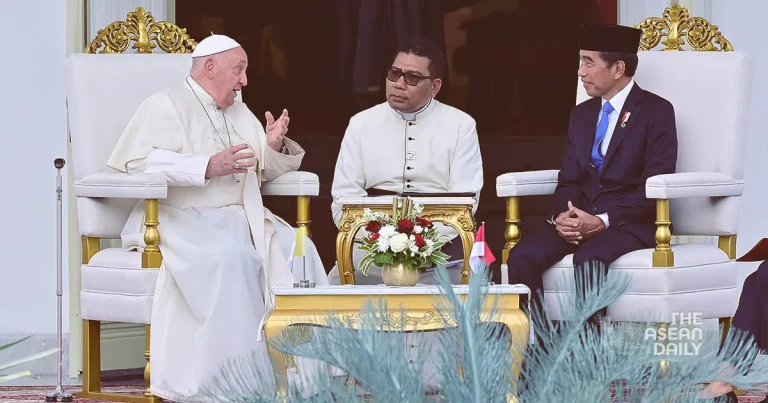4-9-2024 (JAKARTA) Pope Francis’s landmark visit to Indonesia, the world’s most populous Muslim-majority nation, has cast a spotlight on the country’s cherished tradition of religious pluralism, even as it grapples with rising concerns over religious intolerance and majoritarianism.
The 87-year-old pontiff, on his first-ever trip to the Southeast Asian archipelago, has used his three-day visit to champion interfaith dialogue and religious harmony. His message comes at a crucial time for Indonesia, where recent years have seen an uptick in incidents challenging its long-standing ethos of ‘Unity in Diversity’.
Addressing President Joko Widodo, President-elect Prabowo Subianto, and other high-ranking officials at Jakarta’s State Palace on Wednesday, Pope Francis praised Indonesia’s cultural and religious tapestry whilst urging leaders to bolster interreligious dialogue as a bulwark against extremism and intolerance.
“The imposition of uniformity by those in power, particularly in matters that should remain the prerogative of individuals or associated groups, can sometimes lead to violent tensions within nations,” the Pope cautioned, echoing sentiments expressed by his predecessor, Pope John Paul II, during the last papal visit to Indonesia in 1989.
The pontiff’s schedule includes a highly symbolic interfaith gathering at Southeast Asia’s largest mosque, the Istiqlal Mosque, on Thursday. In a powerful gesture of unity, Francis will traverse the 28.3-metre ‘Tunnel of Friendship’, a passage connecting the mosque to the neighbouring Jakarta Cathedral, embodying Indonesia’s national philosophy of ‘Bhinneka Tunggal Ika’ (Unity in Diversity).
President Widodo, highlighting Indonesia’s vast diversity encompassing 714 tribes and 17,000 islands, emphasised the Pope’s visit as carrying “a very strong message about the importance of celebrating differences.”
However, observers note that the past decade has seen a worrying rise in majoritarianism, potentially undermining the religious harmony in a country where nearly 90% of the 280 million population is Muslim, with Catholics comprising only about 3%.
Yenny Wahid, director of The Wahid Foundation, an Islamic research centre, told This Week in Asia, “We’re witnessing a decline in the protection of minorities. The Pope’s visit serves as a crucial reminder of the need for solidarity beyond religious divides.”
Halili Hasan, executive director of the Setara Institute, a Jakarta-based NGO focusing on political and religious freedom, described religious freedom under Widodo’s 10-year rule as “still very problematic.” The institute’s recent study revealed a concerning increase in violations of religious freedom, with Christians and Catholics being the most affected in the past year.
Despite these challenges, the Pope’s visit has sparked enthusiasm among Indonesia’s Catholic community. Elssa Lanamana, a 32-year-old nurse from South Jakarta, expressed her excitement about attending the Pope’s Mass, describing it as a “once in a lifetime opportunity.”
The pontiff’s modest travel arrangements and humble demeanour have not gone unnoticed, providing a stark contrast to recent protests against perceived government extravagance. Yenny Wahid noted, “The Pope’s simple lifestyle, caring for humanity and the marginalised, offers inspiration, particularly in light of recent student protests against the perceived hedonistic lifestyles of government officials.”




